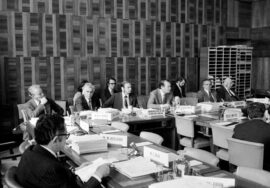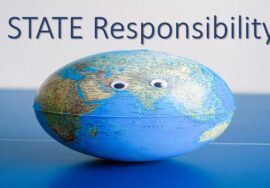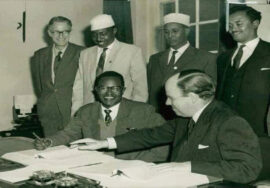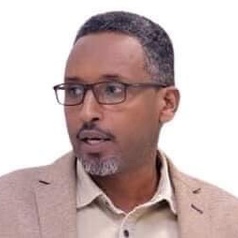What Are JSL Politicians Saying About Somalia Talks?
What Are JSL Politicians Saying About Somalia Talks?
SUMMARY OF CONFERENCE PRESENTATIONS 28th October, 2012
I question whether POLITICIANS Somalilanders harbored similar political feelings during the ILLEGAL union with Somalia in the sixties. Is history repeating itself: 2012 and 1960s?
JSL Politicians are attempting to persuade their citizens regarding talks with Somalia.
Representatives from civil society, government institutions, policy makers, academics, journalists, international scholars and traditional leaders gathered in Hargeisa, Somaliland October 28th and 29th, 2012, for the third Annual Conference of the Social Research and Development Institute (SORADI).
WHO’S WHO IN SOMALILAND INTELLECTUALS ABOUT RECOGNITION/ TALKS WITH SOMALIA
Dr. Sa’ad Ali Shire, the Minister of National Development and Planning, acknowledged the privilege of being the keynote speaker in this annual conference that has brought together diverse and distinguished intellectuals and scholars. In his presentation the Minister touched all three components of the conference title; Somaliland statehood, recognition and the talks with Somalia. Starting with the question we can call Somaliland a state and does it fulfill the requirements of a state? The Minister outlined the basic requirements of a state, such as a permanent population, defined territory, established government, and declared that Somaliland meets these criteria.
The Minister further discussed whether Somaliland deserves an international recognition. He argued that Somaliland is not a newly created state, regarding the long historical roots of Somaliland people with some of the ancient civilization such as Egypt and the Othman Empire and the fact that its territory had been a British Protectorate for almost 76 years and that on attaining independence in June 1960 was recognized by 35 countries. He also mentioned that opening dialogue with Somalia was a real opportunity for Somaliland to present its case to the world. He fully endorsed the idea of continuing talks with the newly elected Somalia president and his cabinet. He stated that there are common issues that would need collaborative efforts of both governments, which include: Common social interests, concerns about the environment, economic interest (same as those economic issues and interests Somaliland shares with other neighboring countries), Common security concerns and issues which are linked to the previous Union such as Assets and legalities.
The Minister concluded his speech recognizing the risks associated in Somaliland’s talks with Somalia and its attendance to conferences in London, Istanbul and Dubai. He said misinterpretation of Somaliland’s intentions as a reunion talks and Somaliland revisiting its claims or softening its position is the major risk involved. However, the Minister concluded how these risks were managed. “In these conferences, Somaliland Government would be would be treated on equal basis with the Somali government.
Session I: Talks between Somaliland and Somalia.
The first presenter was Adam H Ali, Advocate and Conflict Resolution Practitioner & Director of Institute of Peace and Conflict Studies (IPCS) University of Hargeisa (UoH).
Adam Presented about the Legal aspect of the Talks between Somaliland and Somalia. In his paper, he discussed the legal issues surrounding the talks between Somaliland and Somalia. He provided clarity on how Somaliland should build it is argument to set strong legal bases for its case. He spoke about the legal mistakes made in the union of 1960 from both parties. These mistakes include: that there was no legal team, especially legal drafters to represent the Somaliland British Protectorate. There was no enough time for negotiations and discussions for future discourse for both entities and therefore, Italian Somalia dominated all the legal steps, including drafting of the constitution, voting for the act union and other mechanisms.
The presentation further explained the legal arguments of both sides (Somaliland and Somalia): Somaliland’s argument for self Determination and dissolution of the union as opposed to Somalia’s territorial integrity argument. He explained Somaliland’s argument for Self-Determination and pointed that Somaliland is not a state seceding from its parent State, but has regained its independence and suspended only the dysfunctional unity with its counterpart, while asserting and maintaining the territory and boundaries left by the British government in 1960.
Mr. Adam spoke about the Scope of Somaliland’s right to exercise self-determination and its critique. The first justification that Somaliland may claim independence lies in its history as a British colony. By invalidating its union with south Somalia because there was no national referendum or popular vote on the matter. If there was no union, Somaliland still exists as an independent entity.
The paper also spoke about the principle of Territorial integrity as the core argument of the Somalia part which clearly goes against any attempt that encourages secession or border changes. “Somalia presents Somaliland case as unilateral secession.” Said Adam. The paper defined the different types of secession (bilateral secession, unilateral secession and de facto Secession) and how each type is supporting/opposing Somaliland’s case and what are the challenges;?
He mentioned the important steps which have been followed by Somaliland since 1991: Declaration of Self-determination in 1991, Referendum for the new Somaliland constitution in 2001, the African Fact-finding Mission in 2006 and its recommendations. He also spoke about the legal precedents from the region and International Instruments that Somaliland can use such as the case of Eritrea, South-Sudan, Kosovo and other similar cases.
Finally he gave recommendations to the Somaliland government and the talks committee:
1. Somaliland should prepare its answer legally as its arguments may be nullified the fact of the unification which democratically elected leaders of each former colony oversaw the unification process.
2. Somaliland to prepare solid argument to fulfill the conditions of a unilateral secession.
3. The focus should be that Somaliland regained its independence and it suspended only the dysfunctional unity with its counterpart, while it is asserting its authority and maintaining the territory and boundaries left by the British government on the base of the self- determination.
4. Somaliland government should establish legal scenarios.
5. There should be an early preparation of legal expert and interpretation.
6. Legal related tools and resources needed during the talks which include:
• Legal Experts to prepare a base for Somaliland case
• Historians to
• civil Society/Non-state actors
• International Experts.
The second speaker of session one, Dr. Mohamed Fadal, Executive Director of SORADI presented about Somaliland Independence, dialogue with Somalia and the development. Dr. Fadal started his presentation about the basis of Somaliland separation and statehood, which are: historical factor as an independent state with defined borders, victory in armed struggle which was won by the sword, the popular referendum and constitutional process. And the fact that Somaliland has fulfilled Montevedeo criteria of statehood and also spoke about the viability of Somaliland state regarding its governance model, population edging towards 4 million, defined territory of 137,600Km2 including sea, mountains and plains. He also spoke about its resources such as livestock, other minerals, ports, marine, mountains, wind and sun energy, agriculture, young population etc. and the Geostrategic assets which situates Somaliland the heart of world map and critical passage of international trade and shipping lanes; a gateway Ethiopia to Ethiopia and continental Africa.
Dr. Fadal argued that Somaliland recognition would bolster security against terrorism and state- collapse. The resultant aid flows would enable greater regional and national development. A recognized Somaliland would also facilitate investment through providing investor guarantees, clarity on title, and exposure to international financing. And for sustained peace and stability in the region international community need to engage a fully recognized government.
Dr. Fadal also presented the parallel examples for Somaliland and complexities surrounding their independence such as Eritrea which made Ethiopia landlocked, Kosovo which took away religious and historical connection to Serbs, East Timor which also took away oil resources for Indonesia to forgo and South Sudan which took away Oil and the sources of the Nile. But for Somaliland, it only takes away claims from AU charter and Somalia.
He said the closest parallel is Kosovo as the two cases have similar characteristics: both unilaterally declared independence, parent states subject atrocities against civilians and attempted ethnic cleansing etc. Parent states of both claim sovereignty over them. Also both Somaliland and Kosovo satisfy Article 1 of 1933 Montevideo declaration of rights and duties of states. Therefore, “independence is the only viable option to promote stability in the region, in line with US endorsement of Kosovo independence.”
Furthermore, in his presentation Dr. Fadal spoke of talks between Somaliland and Somalia as inevitable but with no easy agenda to start, but still optimistic because of Somalia’s new government with a better mandate than before. On the other hand, Somaliland Government is bound by the Constitution to discuss independence, but for dialogue it has a room to wiggle; Dr. Fadal concluded with the suggestion that first steps for the dialogue to be about the mutually agreeable areas such as, trade facilitation, civilian people’s unhindered movements, cooperation on security issues, fight against piracy and terrorism, cross-border animal and human health issues etc. Other things Somaliland needs to explore included; shared use of defunct Somali state assets, cooperation on EEZ issue especially cooperation on delineating border with other counterpart states such as Yemen, customs and export issues and cross-border mineral exploration and exploitation.
Breakout Session I: Talks & the recognition complexities
This was followed by a group discussion on the issue of Somaliland talks with Somalia and the complexities surrounding Somaliland recognition. The participants of the conference were split into three groups to discuss these two questions and report back to the panel.
All the three groups agreed that the talks are very timely and endorsed the continuation of the talks. They all agreed that the talks are still in the first stage and that there have not been serious preparations, except logistical preparations to attend the conferences. But the groups deemed it paramount for serious preparations for the talks to happen and transparency of the process should be a priority for the Somaliland government. The changes happening in the south create an opportunity for the talks to continue. However, the groups expressed their concern how Somalia is dictating the venue and the timing of the talks- they said. It wasn’t random that they choose countries such as Turkey and the UAE, which are both supportive of the union.
The Complexities Surrounding the Somaliland recognition and the way forward
The groups reported a long list of political and economic complexities surrounding the Somaliland recognition and the way forward.
Political complexities
• The fact that there was no legitimate body to talk to from the South, despite the recent changes was a major challenge.
• The attitude of the international community towards Somaliland, which seems unchanging.
• The internal dispute in the eastern regions of Somaliland is also a problem.
• Somaliland’s weak foreign policy and the lack of legal documentation and legal frameworks
• No super power is supportive of the Somaliland case.
• The reluctance of IGAD and opposition of the Arab-League due to geopolitical reasons are serious impediments to Somaliland recognition.
The way forward
• “Long range” strategies need to be put in place in pursuit of recognition- possibility of taking our case to the International Court of Justice.
• Establishment of Independent Recognition Commission or a form of a think tank to deal with the international community that is multidisciplinary
• Explore other pre-recognition statuses such as those of Taiwan, Palestine etc
• Create alliances with countries that have gone through similar processes
• UNITY- focus on local issues and resolve them rather than focusing only the international community
• Focus on other countries such as Africa/Asia/ME and not just on the West
• Put in display the mass graves that were recently found as proof of genocide to legitimize our reasons for wanting separation
Recommendations:
Internal Processes:
- Somaliland needs a multidisciplinary think- tank type of an institution which can serve as a hub for all information related to recognition, statehood, and independence, through participatory research, nationwide information gathering and analysis to deal with the international community.
- Somaliland needs to adopt serious institutional improvement plans to strengthen public institutions, promote good governance, tackle corruption and to achieve effective service delivery.
- The creation of an independent Recognition Commission to closely work with the recognition and independence think- tank recommended above.
- Although Somaliland fits into the definition of sovereign state, there are still internal issues which can slow down the search for International recognition. Therefore, the conference strongly recommended UNITY to be established within the country, secure country’s borders, resolve internal issues such as the eastern regions conflicts, rather than only focusing International recognition.
- The conference stressed the importance of ECONOMIC RECOGNITION first. The country needs significant economic reform to properly exploit the country’s natural resources to increase local production for export.
- Fostering a culture of Nationalism to mobilize the citizens, create both local and Diaspora recognition advocates across the globe to convince the international community to recognize Somaliland.
International Processes:
- Somaliland needs to create alliances with countries that have gone through similar processes such as South-Sudan, Kosovo, and Eretria, Taiwan etc. Somaliland research institutions and think-tanks need to take these countries as case studies to strengthen their argument.
- The country needs to consider other International statuses such as that of Taiwan, Palestine as a stepping stone to full sovereign statehood.
- The conference stressed the importance of effective foreign policy in both the short and the long term to realize International diplomatic recognition. The processes needs to be participatory, the foreign ministry should be open to anyone who can positively contribute to process.
- The country’s foreign policy shouldn’t focus only on the West, but also needs to give due attention to other countries in Africa, Asia and the Middle East and also to establish strong economic ties with them, which would eventually lead to international recognition. Close cooperation and working mechanism with regional organizations, such as IGAD and the AU needs to be established.
- Somaliland needs to prepare all its evidences for wanting international recognition, such as the mass graves that were recently found as proof of genocide to legitimize our reasons for unilateral declaration for independence.
- To find a way to take our case to the international court of justice.










